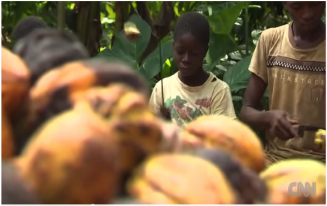 Ten-year-old Abdul earns no wages for his work on a cocoa farm. Ten-year-old Abdul earns no wages for his work on a cocoa farm.
Tags: children/youth, food/agriculture, globalization, inequality, chocolate, cocoa farming, ivory coast, slavery, 00 to 05 mins
Year: 2012 Length: 1:38 Access: YouTube Summary: This video from CNN is a short story about child slavery in chocolate plantations. Most people love chocolate. However, contrary to what many may believe, chocolate does not come from a factory in Switzerland, Belgium, or Italy. At least not to start with. Around 70% of the world's chocolate comes from West Africa, and most of that from the Ivory Coast. These plantations are often in areas where there is little other work, creating a monopoly on opportunity. Lately, more and more people are finding evidence of child slavery on cocoa plantations. In this video, CNN reporters interview several child slaves working on cocoa farms. One of these children is Abdul, a ten-year-old who has been working on the Ivory Coast since he was seven. Abdul says that he earns no money from his work, only food and shelter. Yaku, a sixteen-year-old who also works on the plantations says that he has never been to school. These children work in dangerous conditions, which can leave scars—both physical and mental. Yaku has scars on his legs from machete accidents. CNN says that there is an estimated 100,000+ children in the worst kinds of child labor worldwide. That includes child slaves in the chocolate industry. In the documentary The Dark Side of Chocolate, researchers go undercover and look at child slavery. While child slavery is illegal in the Ivory Coast, it still happens in practice. The plantations where it occurs may supply some of the world’s biggest companies, such as Nestle and Hershey. This video is useful for looking at how Western consumerism affects the world, and how social justice initiatives such as the CNN Freedom Project can help. For more information, check out The Sociological Cinema's other video on the chocolate industry, which explores Marx's concept of alienation, or Kelsey Timmerman's book Where Am I Eating? Submitted By: Abigail Adelsheim-Marshall
6 Comments
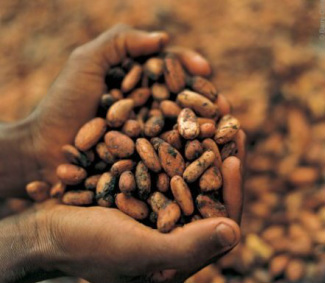 Cocoa farmers may go their entire lives without tasting chocolate Cocoa farmers may go their entire lives without tasting chocolate Tags: capitalism, class, food/agriculture, globalization, marx/marxism, organizations/occupations/work, theory, alienation, chocolate, cocoa farming, commodity chains, ivory coast, species-being, subtitles/CC, 06 to 10 mins Year: 2014 Length: 5:55 Access: YouTube Summary: It is quite common to hear people discuss Karl Marx's notion of alienation as a term that simply describes widespread feelings of unhappiness and psychological distress among workers. It's true that one result of alienation may be unhappiness, but the term was intended to describe much more than workers' feelings. It's important to remember that Marx wrote about alienation as a condition that arises from the social relations that form within a system of capitalist production. For instance, Marx worried that one consequence of the division of labor in capitalist societies is that workers had become estranged from each other. Marx was also interested in drawing attention to workers' relationships to their work (i.e., species-being). For example, prior to modern capitalism, a woodworker could express herself through her work by making unique decisions about how pieces of furniture were to be constructed. However, under capitalism workers are often not afforded the ability to express themselves through their work. Work has instead become a series of routinized movements, making every new piece of furniture identical to the last. In addition to the relationship between workers and their work, Marx also wrote about alienation in reference to the relationship between workers and the products they produce. If one thinks about it, capitalism is a peculiar system in that it compels people to produce objects that do not belong to them. Again, the woodworkers of long ago could conceivably keep the furniture they built, or if the mood struck them, they could give it away as a gift. Under modern capitalism, the furniture workers produce generally belong to their employers. Moreover, modern capitalism is a system that has people creating things they may never even use. Although an Ikea employee might spend her day helping construct the components of low cost furniture, her home may not actually contain a single product from Ikea. Another rather vivid example of this last form of alienation can be observed in the above video, which features Ivory Coast cocoa farmers who have never even tasted chocolate. Note that The Sociological Cinema has also explored Marx's notion of alienation as it can be observed on assembly line work and on modern chicken farms. Submitted By: Lester Andrist  Willa Sparks rides the bus home from a grocery store across town. Willa Sparks rides the bus home from a grocery store across town. Tags: class, food/agriculture, health/medicine, inequality, race/ethnicity, rural/urban, food desert, food justice, poverty, racism, 11 to 20 mins Year: 2010 Length: 13:58 Access: Vimeo Summary: Poor diets are a result of the structural inequalities that limit access to healthy food, not individual behaviors. Hungry for Health: A Journey through Cleveland’s Food Desert documents a day in the life of Willa Sparks, a woman living without ready access to fresh and affordable food. Instead, she must rely on corner stores, fast food restaurants, and gas stations selling processed and frozen foods. By most accounts, Sparks is a statistic. She lives in an economically deprived and segregated urban area. She is also single and raising a child. However, Sparks is not portrayed as a victim in Hungry For Health. Members of minority groups, including women, are more likely to be in poverty and living in food deserts; thus, they are more likely to suffer from poor health. While residential environments do shape racial health disparities, the film focuses on Sparks’ efforts to combat social inequalities. Denied the fresh vegetables and fruits needed to maintain a healthy diet, Sparks suffers a heart attack and is diagnosed with diabetes. The doctor warns her to change her eating habits or die young. Sparks rises to the challenge learning the nutritional knowledge she lacked and overcoming the first hurdle to accessing fresh foods for her family. Proximity, income, and mobility also influence her accessibility to a healthy diet. Sparks doesn’t own a car and can’t afford a taxi, so she must rely on public transportation to go to the market. At the store, she carefully selects her groceries, spending wisely and shying away from cheaper junk food. Her tight budget forces her to consider her bus pass as part of her daily expenditures. Because she’ll spend time outside waiting for buses and walking to destinations, she must always be prepared for inclement weather. There’s no direct route to the store, so Sparks spends the good part of the day traveling to purchase food before returning home to start preparing it. The process is slowed by her health and poor mobility. She walks with a cane and carries home as many grocery bags as she can lift. Viewers gain both a deeper understanding of food deserts and a new reverence for the people living in them. For more information about the film, please contact the filmmaker at theresa.desautels@gmail.com. Submitted By: Mary Barr, PhD  What are the conditions where their food was produced? What are the conditions where their food was produced? Tags: commodification, consumption/consumerism, economic sociology, food/agriculture, marx/marxism, theory, commodity fetishm, de-fetishism, local food, 00 to 05 mins, 06 to 10 mins Year: 2011 Length: 2:27; 7:46 Access: YouTube (short version) YouTube (full version) Summary: In Marxist theory, commodity fetishism is the process by which people come to see commodities in terms of their physical properties and market value, rather than being derived from the labor and labor conditions that produced it. This is important because it obscures the social relationships between people and reduces commodities to the economic exchange between buyer and seller. Value then falsely appears to be the natural part of that commodity, rather than in the labor that produced it. For example, consider the production and consumption of chicken. In a conventional exchange at the supermarket, consumers know nothing about the labor and conditions that went into producing the chicken. The purely market-based exchange obscures and hides the exploitation and typical industrial farming methods, which are shown in this Food Inc clip or this Samsara clip, making it appear that the value of the chicken comes from the product itself. Local economies, including the local food movement, are often attempts to reverse this process by re-situating economic activity within the social relations that produced it. Through local economies, such as farmers' markets and local handicrafts, consumers can interact directly with local producers and understand the labor process and labor conditions of how goods are produced. In short, it seeks to de-fetishize the commodity. This hilarious clip from Portlandia illustrates these concepts through satire. It shows the main characters ordering a chicken dish in a restaurant, where they inquire about the conditions in which it was raised. For example, they ask about the size of its roaming area, its diet, if it is local and organic, about who is raising the chicken, and if the farmer lives locally. They learn the chicken's name is Colin and are given his "papers." In the full clip, they also travel to the farm where Colin was raised, get a tour, and meet the workers who raised Colin and the other chickens. They end up staying at the farm for 5 years, but then realize the farm is run by a cult, and ultimately return to the restaurant and inquire about the salmon. For related videos, see commodity fetishism illustrated in this Macklemore music video, and de-fetishism through a promotional fair trade video or Chipotle ad. Submitted By: Paul Dean 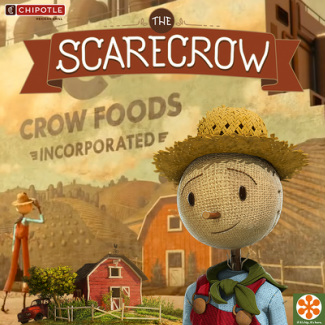 "The Scarecrow" explores the McDonaldization of society "The Scarecrow" explores the McDonaldization of society
Tags: capitalism, consumption/consumerism, corporations, environment, food/agriculture, marketing/brands, organizations/occupations/work, science/technology, theory, weber, farming, fordism, george ritzer, mcdonalidzation, rationalization, slow food, subtitles/CC, 00 to 05 mins
Year: 2013 Length: 3:23 Access: YouTube Summary: "The Scarecrow" is Chipotle's most recent commercial exploring the American dependency on highly rationalized farming techniques, which offend human conscience and wreak havoc on the environment (Note that Chipotle created a commercial with similar themes back in 2011). This animated short takes place in a dystopian universe where scarecrows punch in each day at a factory run by their crow overlords, and crow surveillance drones caw whenever production slows. The video is a useful illustration of what George Ritzer has called the McDonaldization of society, which refers to "the process by which the principles of the fast-food restaurant are coming to dominate more and more sectors of American society." Ritzer explains that McDonaldization is characterized by efficiency, calculability, predictability, and control. In and around the barren landscape owned by Crow Foods, one finds examples of efficiency everywhere. Conveyer belts efficiently move workers to their various stations in the factory, and livestock are stacked in crates, one on top of the other—an efficient use of factory space. Scanning the inner workings of the factory, it appears that ground beef, chicken, and pork are being squeezed through narrow chutes, and large blades worthy of a guillotine slice the meats into slabs with such precision that one could easily calculate and predict the amount of meat produced in any given hour. Controlling the pace of production is as easy as pulling a lever. While the video is quite literally Chipotle's straw man fantasy and is created with the aim of developing the Chipotle brand as a healthy, environmentally-friendly meal choice, the McDonaldization of food production is a very real phenomena and one sociologists take very seriously (The Sociological Cinema has also explored the issue here and here). What could be more important than understanding how a system, which was ostensibly developed to nourish vast numbers of people, is actually harmful to human health? Submitted By: Lester Andrist  Film explores cultural history & nutrition of a U.S. culinary tradition. Film explores cultural history & nutrition of a U.S. culinary tradition. Tags: class, culture, food/agriculture, health/medicine, race/ethnicity, African Americans, American South, culinary traditions, soul food, subtitles/CC, 61+ mins Year: 2012 Length: 64:00 Access: iTunes or Amazon (online purchase; trailer here) Summary: In the documentary Soul Food Junkies, filmmaker Byron Hurt "sets out on a historical and culinary journey to learn more about the soul food tradition and its relevance to black cultural identity. Through candid interviews with soul food cooks, historians, and scholars, as well as with doctors, family members, and everyday people, the film puts this culinary tradition under the microscope to examine both its positive and negative consequences. Hurt also explores the socioeconomic conditions in predominantly black neighborhoods, where it can be difficult to find healthy options, and meets some pioneers in the emerging food justice movement who are challenging the food industry, encouraging communities to 'go back to the land' by creating sustainable and eco-friendly gardens, advocating for healthier options in local supermarkets, supporting local farmers' markets, avoiding highly processed fast foods, and cooking healthier versions of traditional soul food." (This excerpt is from the film's website; additional educational materials can be found here; eight healthy soul-food-inspired recipes can be found here.) Submitted By: Valerie Chepp  Scene from LA Times video, "The Challenge Ahead" Scene from LA Times video, "The Challenge Ahead"
Tags: abortion/reproduction, consumption/consumerism, demography/population, environment, food/agriculture, globalization, inequality, rural/urban, 06 to 10 mins
Year: 2012 Length: 5:12 Access: Los Angeles Times Summary: This short video, "The Challenge Ahead: Rising Numbers, Shrinking Resources," accompanies a five-part series from the Los Angeles Times and highlights the causes and consequences of the global population explosion. Demographers anticipate continued population growth driven by the reality that there are now 3 billion people on the planet under the age of 25, and about 1.2 billion of them are adolescents who are entering their reproductive years. Projections suggest that by 2050 there will be well over 9 billion people on the earth, and the video highlights many of the resource demands of this many people. For instance, Jonathon Foley of the Institute on the Environment asks, "how are we going to feed 9 billion people without trashing the planet?" and Joel E. Cohen notes that humans are currently consuming resources on planet earth as if the earth were about 50% more productive. The connection between consumption (and production) and population is also explored in Foley's 2011 Ted Talk, where he reports that the total area humans are currently using for agriculture is about the size of South America (16 million square kilometers), while the total area used as pasture and range land is about the size of Africa (30 million square kilometers). Humans are also currently using about 50% of Earth's fresh water, and of this share, about 70% is used for agriculture. But after connecting population growth to agricultural demands, it is only a short distance to discussions exploring the connections between population and environmental degradation, or even climate change. After all, as Foley also points out in his Ted Talk, agricultural activity is by far the largest contributor of greenhouse gases. Thus "The Challenge Ahead" is an excellent teaser for any introduction to the field of demography, and it can be used to spur discussion about the importance of the field for tackling some of the most formidable challenges of the twenty-first century. Note that The Sociological Cinema has previously recommended clips that explore problems associated with population (here, here, and here). Submitted By: Lester Andrist  George adopts a cultural practice of the elite. George adopts a cultural practice of the elite.
Tags: class, consumption/consumerism, culture, economic sociology, knowledge, social construction, theory, aesthetic, bourdieu, elite, seinfeld, taste, 00 to 05 mins
Year: 1994 Length: 2:11 Access: YouTube Summary: In his often densely worded prose, Bourdieu discusses how those in power define aesthetic concepts such as taste. Referring to surveys of French citizens from different economic and educational backgrounds, he shows how social class tends to determine a person's likes and interests, and how distinctions based on social class get reinforced in daily life. He observes that even when the subordinate classes may seem to have their own particular idea of good taste, "the working-class 'aesthetic' is a dominated 'aesthetic' which is constantly obliged to define itself in terms of the dominant aesthetics..." In this clip, a wealthy businessman (Elaine's boss) is observed eating a candy bar using a knife and fork. Elaine tells her friends about this unusual behavior, but George sees it as being "proper" or culturally polished. He later eats his candy bar the same way in a public place. As more people see this behavior, more people begin practicing the behavior. This spreading cultural practice illustrates how the society, and conceptions of proper behaviors, are shaped and dominated by the social elite. Submitted By: Julie C. 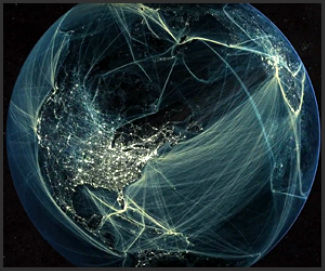 Tags: demography/population, environment, food/agriculture, globalization, inequality, rural/urban, anthropocene, great acceleration, subtitles/CC, 00 to 05 mins Year: 2012 Length: 3:29 Access: YouTube Summary: In sparkling electric blue, this narrated visualization illustrates the impact humans have had on the Earth's ecosystems from the time of the industrial revolution to the present. Referring to a new geological epoch, the narrator boldly announces, "Welcome to the anthropocene." The anthropocene is marked by the decisive role humans now play in shaping the state, dynamics and future of the Earth system. Among other indicators, scientists point out that anthropogenic processes now account for more sediment transport than natural processes, such as the erosion from rivers. Humans have also measurably altered the composition of the atmosphere, oceans, and soils, as well as the cycles associated with elements such as carbon, nitrogen, and phosphorus. The more than seven billion of us who currently reside on the planet now breath a chemically altered atmosphere of our own making, and we are witnessing the spread of oceanic dead zones. From a sociological standpoint, the adjective "anthropogenic," which simply denotes something that is produced by humans, is imprecise. It is not the mere presence of billions of homo sapiens which has altered the Earth's systems; rather, it is the way homo sapiens interact with the Earth's systems—our social processes. The clip works well as a way to enter into a discussion about environmental sociology. Specifically, one could easily draw on it to highlight the tension between understanding how changes in the environment get framed as problems by scientists, media, and other social actors, and how certain environmental changes have a real ontological status, irrespective of that framing. Submitted By: Lester Andrist 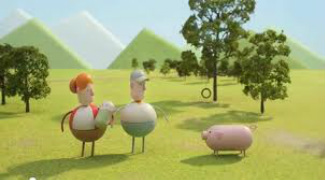 Tags: capitalism, commodification, consumption/consumerism, food/agriculture, economic sociology, marketing/brands, theory, weber, alienation, assembly line, farming, fordism, mass production, McDonalidzation, rationalization, simulacra, slow food, 00 to 05 mins Year: 2011 Length: 2:20 Access: YouTube Summary: Using Pixar-esque animation and Willie Nelson’s twang, this Chipotle commercial examines the development of our food production system. The commercial-story begins with images of pigs in an open pasture, which are then subjected to larger and more mechanized farming practices that lead to a highly industrialized food production system. It then shows a farmer (who evokes images of Middle America) as he slowly realizes the toxic effects, both on body and planet, of rationally commodifying agriculture and livestock. Set to Coldplay’s “The Scientist” (heartbreakingly sung by Willie Nelson), the main lyrics reference going “back to the start” and a return to earlier farming practices. Within the linear segment, we learn that the said farmer’s consciousness-raising leads to cage-free farming, thereby allowing him, his family, and their farm animals to lead a more socially conscious–and seemingly happy–existence. This clip can bring to life theories of consumption, aiding sociologists-in-training in conceptualizing concepts including Weber’s theories on rationalization, George Ritzer’s theories on McDonaldization, and Jean Baudrillard’s musings on simulacra. It can be useful to spark conversations on the social and environmental impacts of consumption behaviors and the potential impacts of industrial farming practices for human health. Finally, Chipotle’s commercial provides an opportunity to examine the complexities–and sometimes contradictions–of advertising. After a discussion on whether they are prompted (as educated consumers) to frequent Chipotle now that they’ve seen the commercial, the viewer might consider some little known facts and inconsistencies of the fast-food chain. For example, the McDonald’s Corporation was at one time a major investor in Chipotle, though now divested from the Mexican grill. In January 2011, the fast-food chain was in the Minnesota headlines when several locations were hiring undocumented workers, therefore coming to the attention of U.S. Immigration and Customs Enforcement (ICE). Once discovered, Chipotle fired the employees, ranging from 350 to 700 people. This begs the question, while ethical treatment is being maintained for farm animals, is ethical treatment being maintained for actual human employees? Submitted By: Beverly M. Pratt |
Tags
All
.
Got any videos?
Are you finding useful videos for your classes? Do you have good videos you use in your own classes? Please consider submitting your videos here and helping us build our database!
|
 RSS Feed
RSS Feed
